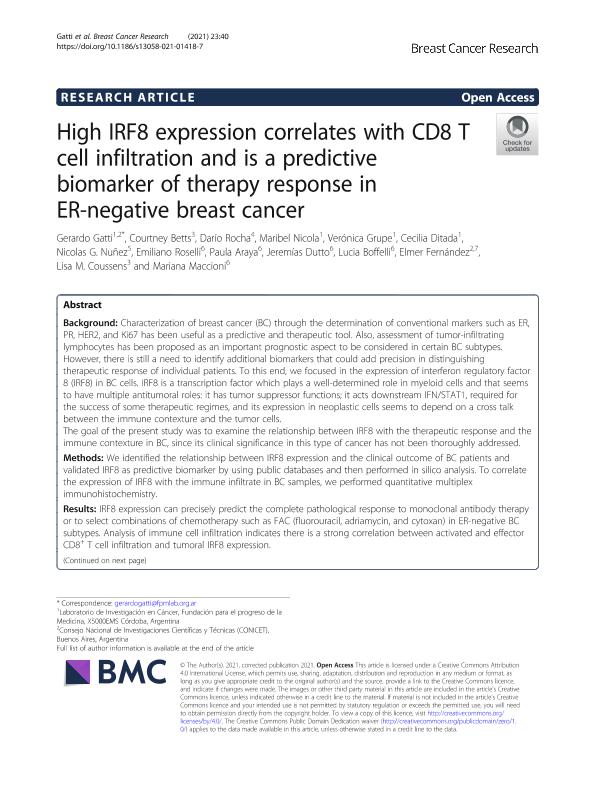Artículo
High IRF8 expression correlates with CD8 T cell infiltration and is a predictive biomarker of therapy response in ER-negative breast cancer
Gatti, Gerardo Alberto ; Betts, Courtney; Rocha, Darío Gastón; Nicola, Maribel
; Betts, Courtney; Rocha, Darío Gastón; Nicola, Maribel ; Grupe, Verónica Maria; Ditada, Cecilia; Núñez, Nicolás G.; Roselli, Emiliano
; Grupe, Verónica Maria; Ditada, Cecilia; Núñez, Nicolás G.; Roselli, Emiliano ; Araya, Paula
; Araya, Paula ; Dutto, Jeremias
; Dutto, Jeremias ; Boffelli, Lucía; Fernández, Elmer; Coussens, Lisa M.; Maccioni, Mariana
; Boffelli, Lucía; Fernández, Elmer; Coussens, Lisa M.; Maccioni, Mariana
 ; Betts, Courtney; Rocha, Darío Gastón; Nicola, Maribel
; Betts, Courtney; Rocha, Darío Gastón; Nicola, Maribel ; Grupe, Verónica Maria; Ditada, Cecilia; Núñez, Nicolás G.; Roselli, Emiliano
; Grupe, Verónica Maria; Ditada, Cecilia; Núñez, Nicolás G.; Roselli, Emiliano ; Araya, Paula
; Araya, Paula ; Dutto, Jeremias
; Dutto, Jeremias ; Boffelli, Lucía; Fernández, Elmer; Coussens, Lisa M.; Maccioni, Mariana
; Boffelli, Lucía; Fernández, Elmer; Coussens, Lisa M.; Maccioni, Mariana
Fecha de publicación:
12/2021
Editorial:
BioMed Central
Revista:
Breast Cancer Research
ISSN:
1465-5411
e-ISSN:
1465-542X
Idioma:
Inglés
Tipo de recurso:
Artículo publicado
Clasificación temática:
Resumen
Characterization of breast cancer (BC) through the determination of conventional markers such as ER, PR, HER2 and Ki67 has been useful as a predictive and therapeutic tool. Also, assessment of tumor-infiltrating lymphocytes has been proposed as an important prognostic aspect to be considered in certain BC subtypes. However, there is still a need to identify additional biomarkers that could add precision indistinguishing therapeutic response of individual patients. To this end, we focused in the expression of Interferon regulatory factor 8 (IRF8) in BC cells. IRF8 is a transcription factor which plays a well determined role in myeloid cells and that seems to have multiple antitumoral roles: it has tumor suppressor functions; it acts down stream IFN/STAT1, required for the success of some therapeutic regimes and its expression in neoplastic cells seems to depend on a cross talk between the immune contexture and the tumor cells.The goal of the present study was to examine the relationship between IRF8 with the therapeutic response and the immune contexture in BC, since its clinical significance in this type of cancer has not been thoroughly addressed. We identified the relationship between IRF8 expression and the clinical outcome of BCpatients and validated IRF8 as predictive biomarker by using public databases and then performed in silico analysis. To correlate the expression of IRF8 with the immune infiltrate in BC samples we performed quantitative multiplex immuno histochemistry. IRF8 expression can precisely predict the complete pathological response to monoclonal antibody therapy or to select combinations of chemotherapy such as FAC (Fluorouracil, Adriamycin and Cytoxan) in ER negative BC subtypes. Analysis of immune cell infiltration indicates there is a strong correlation between activated and effector CD8 + T cell infiltration and tumoral IRF8 expression. Conclusions Wepropose IRF8 expression as a potent biomarker not only for prognosis, but also forpredicting therapy response in ER negative BC phenotypes. Its expression inneoplastic cells also correlates with CD8 + T cell activation and infiltration. Therefore, our results justify new efforts towards understanding mechanisms regulating IRF8 expression and how they can be therapeutically manipulated.
Palabras clave:
BREAST CANCER
,
DNA METHYLATION
,
IRF8
,
PREDICTIVE MARKER
,
TUMOR-INFILTRATE
Archivos asociados
Licencia
Identificadores
Colecciones
Articulos(CCT - CORDOBA)
Articulos de CTRO.CIENTIFICO TECNOL.CONICET - CORDOBA
Articulos de CTRO.CIENTIFICO TECNOL.CONICET - CORDOBA
Citación
Gatti, Gerardo Alberto; Betts, Courtney; Rocha, Darío Gastón; Nicola, Maribel; Grupe, Verónica Maria; et al.; High IRF8 expression correlates with CD8 T cell infiltration and is a predictive biomarker of therapy response in ER-negative breast cancer; BioMed Central; Breast Cancer Research; 23; 1; 12-2021; 1-15
Compartir
Altmétricas



